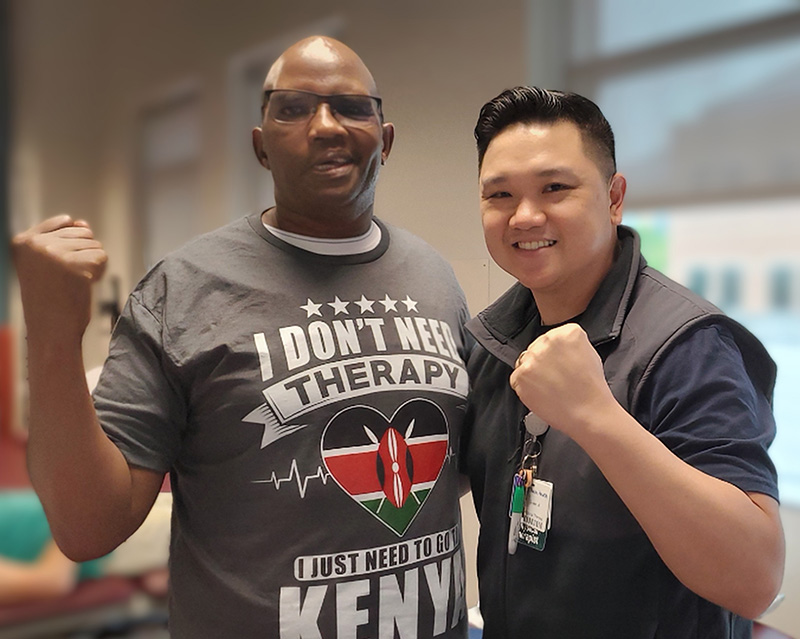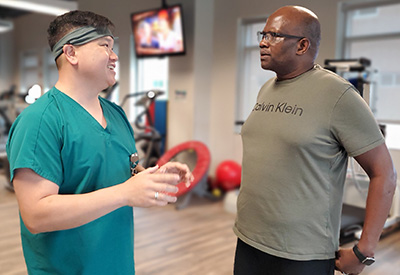ALLEN, Texas — Minutes before a radio interview, Abraham Kirwa wondered why his vision was suddenly blurry. He attempted to sip some water. It came back up with force, along with everything else he’d eaten that day. The 54-year-old Kenyan diplomat never imagined he’d come close to losing his life to a stroke, especially on his birthday.

Abraham Kirwa and Bryan Anderson
Kirwa’s harrowing patient journey would involve a total of two strokes, a congestive heart failure diagnosis, and 18 days in a Kenyan hospital.
Once he became strong enough to travel, Kirwa flew to North Texas, where he received specialized care. His neurologist then recommended he participate in a neurological rehabilitation program. Texas Health Presbyterian Hospital Allen’s program, like those at other locations within the health system, enhances the quality of life for stroke and brain injury patients by improving their physical and cognitive abilities.
After completing neurological rehabilitation at Texas Health Allen, Kirwa said his heartfelt mission is to promote stroke awareness and highlight the importance of quality healthcare.
Kirwa, who moved to North Texas in the early 2000s, currently serves as a member of Parliament in Kenya, which is his birthplace. For the past two years, he’s been living in Nandi County, addressing the needs of more than 200,000 residents in the western part of the country.
Unfortunately, Kirwa said, most of the country lacks a robust healthcare system and access to medicine and medical equipment.
“God doesn’t make you endure something for nothing,” Kirwa said. “My personal experience has motivated me even more to improve the lives of my people, and I will.”
Bryan Anderson, PT, DPT, CSRS, Kirwa’s certified stroke rehabilitation specialist at Texas Health Allen, said advocating for high-quality patient care is important.
“Mr. Kirwa dealt with limited health resources in his country, but he never gave up,” Anderson said. “He sought proper treatment and customized care. Now, he’s not only surviving but thriving.”
Striving toward progression, not perfection
Anderson, who has worked at Texas Health Allen for three years, vividly remembers when Kirwa began rehab. He had a severe facial droop, speech difficulty, an unbalanced gait and depended on a cane to walk.

“Before Mr. Kirwa received treatment in the U.S., he’d been told it would take years before he could walk and [he would] probably never run again. Mr. Kirwa was a long-distance runner in college, so I knew that was one of many activities he wanted to do again,” Anderson said. “I took that as a challenge, and we incorporated tangible running patterns, such as hopping and jogging on different surface areas, into his rehab program.”
Anderson constantly reminded Kirwa to focus on progression and not perfection. For 12 weeks, Kirwa’s neuro-focused rehab included:
- Physical therapy, which focuses on balance, coordination, strength and mobility improvements
- Occupational therapy, which focuses on improving movement and flexibility to perform daily tasks at home and at work
- Speech therapy, which addresses swallowing difficulties and improves communication skills
More than 13 million people a year are affected by stroke worldwide, according to the World Health Organization. The lack of access to a comprehensive rehab program is just one barrier in the recovery process. Other challenges include a lack of healthcare professionals fully trained in stroke rehab and geographical setbacks, such as patients who live in rural or remote areas.
“With everything I went through, I should have been dead. Instead, I’m talking, walking and running,” Kirwa said. “God directed the right people and the right resources in my path.”
Regaining optimism and renewed passion
Anderson, who lost his mom to a stroke 14 years ago, said he found his calling by empowering others.
“By challenging stroke patients, they develop an expectation of achievement and not one of limitations,” Anderson said. “It’s imperative to break down negative stereotypes and reframe their identity, not as a helpless individual but as a stroke survivor. That transformation is the beauty and benefit of therapy.”
Kirwa will soon return to his duties as a government official, and he is looking forward to sharing his patient journey and regained optimism with the people of his country.
“My therapists at Texas Health Allen and physicians on the medical staff truly listened to how I was feeling, mentally and physically. That’s a critical part of recovery. We need changes in the healthcare system. As a lawmaker in my country, I am committed to doing just that.”
Related News
About Texas Health Resources
Texas Health Resources is a faith-based, nonprofit health system that cares for more patients in North Texas than any other provider. With a service area that consists of 16 counties and more than 8 million people, the system is committed to providing quality, coordinated care through its Texas Health Physicians Group and 29 hospital locations under the banners of Texas Health Presbyterian, Texas Health Arlington Memorial, Texas Health Harris Methodist and Texas Health Huguley. Texas Health access points and services, ranging from acute-care hospitals and trauma centers to outpatient facilities and home health and preventive services, provide the full continuum of care for all stages of life. The system has more than 4,400 licensed hospital beds, 6,400 physicians with active staff privileges and nearly 29,000 employees. For more information about Texas Health, call 1-877-THR-WELL, or visit www.TexasHealth.org.
